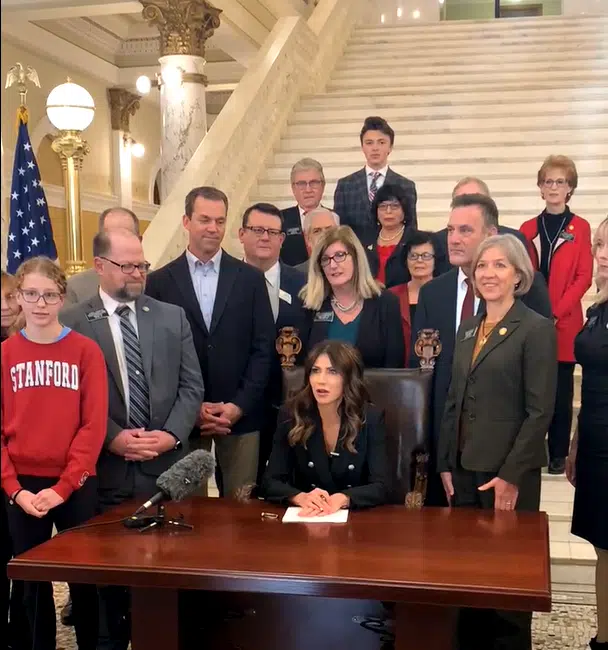JUNE 14, 2022:
South Dakota has joined with 20 other states in a lawsuit calling on President Joe Biden to withdraw the US Department of Agriculture’s new guidance on sex discrimination for schools and programs that receive federal nutritional assistance.
Last month (May 5, 2022), USDA’s Food and Nutrition Service announced it would expand its interpretation of the prohibition on sex discrimination found in Title IX to include discrimination based on sexual orientation and gender identity. The 21 Attorneys General as a result of the change, any state, local agency or program that receives federal funds through USDA’s Supplemental Nutritional Assistance Program (SNAP) or The Food and Nutrition Act must comply or lose federal funding. The AG’s believe the new interpretation is based on a “flawed understanding of the Supreme Court’s decision in Bostock v. Clayton County.”
The National School Lunch Program services nearly 30 million schoolchildren each day– many of whom rely on the program for breakfast, lunch or both. Approximately 100,000 public and non-profit private schools and residential childcare institutions receive federal funding to provide subsidized free or reduced-price meals for qualifying children.
In the letter, the Attorneys General say expanding the concept of “discrimination on the basis of sex” to include gender identity and sexual orientation does far more than offer direction:
- The Guidance is unlawful because it was issued without providing the States and other stakeholders the opportunity for input as required by the Administrative Procedures Act (APA).
- The Guidance is unlawful because the USDA premised it on an obvious misreading and misapplication of the Supreme Court’s holding in Bostock v. Clayton County. Bostock expressly disclaimed application to “other federal or state laws that prohibit sex discrimination”—like Title IX and the Food and Nutrition Act—and expressly did not “prejudge any such questions.”
- The Guidance imposes new- and unlawful- regulatory measures on state agencies and operators receiving federal financial assistance from the USDA. This will inevitably result in regulatory chaos that threatens essential nutritional services to some of the most vulnerable citizens.
The letter was signed by Attorneys General from the following states: Alabama, Arkansas, Florida, Georgia, Idaho, Indiana, Kansas, Kentucky, Louisiana, Missouri, Mississippi, Montana, Nebraska, North Dakota, Ohio, Oklahoma, South Carolina, South Dakota, Tennessee, Texas and Virginia.
JUNE 2, 2022:
South Dakota Governor Kristi Noem is filing another lawsuit against the Biden Administration. This time it’s over an announcement made last month (May 5, 2022) by the US Department of Agriculture’s Food and Nutrition Service.
FNS officials say they will interpret the prohibition on discrimination based on sex found in Title IX (of the Education Amendments of 1972, and in the Food and Nutrition Act of 2008, as amended, Supplemental Nutrition Assistance Program, formerly the Food Stamp Program) to include discrimination based on sexual orientation and gender identity. FNS says they issued this interpretation “to help ensure its programs are open, accessible and help promote food and nutrition security, regardless of demographics.”
However, Noem sees the move as President Biden “holding lunch money for poor Americans hostage in pursuit of his radical agenda. He is insisting that we allow biological males to compete in girls’ sports or else lose funding for SNAP and school lunch programs.” She says the state will “continue to defend basic fairness so that our girls can compete and achieve. I would remind President Biden that we have defeated him in litigation before and are ready to do so again. Mr. President, we’ll see you in court.”
Earlier this year, Noem signed legislation supporters say will “protect fairness in women’s sports.”

South Dakota Governor Kristi Noem, flanked by supporters of the bill, signed SB46 into law Feb. 3, 2022. Noem proposed the bill saying it’s an issue of fairness in women’s sports, not discrimination against transgender people.
USDA FNS says its action is in line with President Biden’s Executive Order on Preventing and Combating Discrimination on the Basis of Gender Identity or Sexual Orientation, and is consistent with the Supreme Court’s decision in Bostock v. Clayton County, in which the Court held that the prohibition on sex discrimination under Title VII of the Civil Rights Act of 1964 extends to discrimination based on sexual orientation and gender identity.







Comments